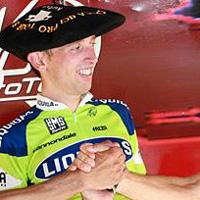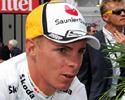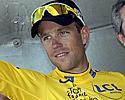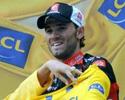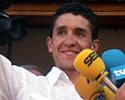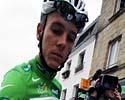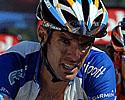Latest Cycling News, July 31, 2008Edited by Hedwig Kröner Clásica San Sebastián: Last test before BeijingBy Bjorn Haake
The Clásica San Sebastián will serve as the final preparation race for the Olympic Games in Beijing with just seven days separating it from the men's road race in China. 239 kilometres stand between the start on the Atlantic Ocean and the winner receiving the traditional txapela hat. The winner will be a power-man who doesn't mind some up-hills. Yet any contenders should have a good sprint, as often a small group arrives at the Donostia Boulevard (Donostia is the Basque word for San Sebastián) to contest the win. The zig-zag course features six categorised climbs. Despite that there are five metas volantes (intermediate sprints), but they are mostly on slightly uphill or downhill sections. They day starts out with the Alto De Orio-Zudugarai (cat 3, km 19), the Alto de Garate (cat 2, km 31) and the Alto de Azkarate (cat 2, km 64). Then comes the first real difficulty of the day. The category two Alto de Udana starts after 84 kilometres. The riders will reach the top - 574 metres of altitude, the race's highest point - 23 kilometres later. This may not allow for decisive move yet, but will zap the energy of weaker riders and will show who won't be in the mix at the finish. A likely escape will still have some leeway over the rollers after the descent from the Udana. However, when the bunch (or what is left of it) approaches the Alto de Jaizkibel, the main favourites will start making their moves. From Lezo at 10 metres of altitude the riders will climb to the top - 465 metres - in nine kilometres. From the Jaizkibel the races will face a long downhill section, but a potential break has to survive the Alto de Arkale if it is to make it to the finish. The climb leaves 16 kilometres of flat-out racing. Small group, big group, bunch sprint, solo breakaway - you will never know in San Sebastián, which makes it such an attractive race. Click here to read the full preview. Riccò's Giro samples re-tested?
Riccardo Riccò, formerly of Team Saunier Duval, may have his truthfulness tested once again. French newspaper L'Equipe reported on Thursday that the rider's Giro d'Italia anti-doping samples would be re-analysed after Riccò confessed to injecting himself with CERA, a last-generation EPO, prior to the Tour de France. In front of the Italian Olympic Committee CONI, the 24 year-old said that he had taken the banned substance on Wednesday, July 2, three days before the Tour start. But he maintained that this was the only time he had cheated, and affirmed his second place in the Giro d'Italia was not tainted. "I rode a clean Giro," he said. "I want to send a message to all of those who believe in me: before the Tour, I always won with my legs only." Riccò's Giro d'Italia samples will be tested once again by the Rome anti-doping laboratory, which did not have the detection method for CERA at the time of the event, in May. Meanwhile, the rider had pointed out that of his ten anti-doping tests taken at the Tour de France, only two showed a positive result. "In theory all the tests should have been positive. The detection method is not efficient to a 100 percent, as the effect of the drug lasts one month," he said. CONI is expected to pronounce a sanction on the rider some time next week. On Thursday morning, Riccò's team-mate Leonardo Piepoli will also explain himself in front of the prosecutor. Piepoli, whose anti-doping tests carried out during the Tour de France came back negative, also admitted to using the drug. Valverde & Kirchen: Classics or Tour?By Hedwig Kröner
Two top ten finishers of this year's Tour de France, Alejandro Valverde (Caisse d'Epargne) and Kim Kirchen (Team Columbia), face a similar dilemma when it comes to organising their season objectives. Both riders perform well all year round, and are able to shine in one-day events like the Spring Classics as well as in stage races such as the Tour de France. Luxembourg's Kirchen finished eighth in the 2008 French Grand Tour, and Spanish Valverde placed ninth. Seeing that both also have a scored Classic one-day races before, and are important members of their teams for a variety of races throughout the season, the top ten placings in the Tour put their team managers in front of a difficult decision. Team Columbia's directeur sportif Rolf Aldag assessed that it wasn't easy to choose between year-round competitiveness and focusing on a Tour de France build-up. "We will make the plan for next season soon," he told Cyclingnews on the penultimate day of the Grande Boucle. "During the Tour, we asked ourselves if it would have been better if Kirchen had started later during the season. Then again, he's a rider who shines in the Classics, too. If you risk it and put everything on the Tour, it wouldn't suit his aggressive riding style, either. You should only do that if you believe that he can one day win it. Otherwise, it's just too nice to see him ride at the Classics. It's not realistic to win everything." Moreover, Aldag said, it was important to respect the wishes of the rider for motivation. "I also think that riders like Valverde or Kirchen really like their Classics. I think it would be hard to start imposing something else on them. These are the races they like best; the ones they prepare for in winter; the ones they look forward to. In that sense, it's difficult to tell them that they should stop doing that, and do everything for the Tour. I think they would react by rejecting it and be unhappy about it. It's important to accept riders the way they are. Kim is not a born Tour de France winner, even if he can achieve a great overall placing. But he can win races like Liège-Bastogne-Liège and Amstel Gold Race. So you have to go with what he wants to do himself, too."
The case of Alejandro Valverde is somewhat different, as the Spaniard has finished on the Vuelta a España podium twice already, and won an impressive number of one-day races. His team manager Eusebio Unzué continued "to believe in Alejandro" and thought that "he will one day be able to win the Tour. Alejandro only started to gather experience in this event when he came to race with us [in 2005 - ed.]. I also think that this lack of experience showed in the key moments this year. But in time, with more experience and maturity, he can achieve this goal, especially since we now have a time in cycling where there's lot much difference anymore between the overall contenders." Still, there is some similarity as to the difficulties both riders face when it comes to putting together a season's race programme. "Alejandro is a rider that maintains this super-competitive level during the whole year," Unzué continued. "For him, any kind of race can be an objective, and he likes it that way. I think we have to go with that. We know that he can win Classics, sprints, mountain stages, one-week stage races, time trials - he's done all that! The only victory he lacks is a Grand Tour. And he already missed out on one by a hair, two years ago at the Vuelta. "He has a lot of qualities. Still looking at the results, I think that in order to be competitive for a Tour de France victory, he has to build up to July in a more calm manner. Certainly, you'd sacrifice a lot of other victory opportunities for that. It's very difficult to make that decision." The question also remains which race goals - Grand Tour overall placings or one-day Classics - count more on the riders' palmarès and in the view of the public. "A top ten placing at the Tour is a highly respected achievement," added Aldag. "You show that you can be competitive over three weeks. On the other hand, a Classics win counts more in certain countries than a top ten placing at the Tour, for example in Belgium. In Germany, people don't value it in the same way. Steffen Wesemann's Flanders victory didn't get a lot of attention at all in Germany, for example. So it really depends." As to Kirchen's and Valverde's next goals this season, they are also similar. Both will ride the Olympics in Beijing - with Valverde at the Clásica San Sebastián this week-end - and hope for a good World Championship in Varese at the end of September. However, Aldag did not know yet how to build up his rider for the event in Italy. "Either Kim takes a break and builds up again for the Worlds, which will be hard, or he just continues on this level, which will be hard, too," he said. Valverde, for his part, will prepare the Worlds with his home Grand Tour. "After the Olympics, Alejandro will take a short break and start at the Vuelta afterwards. But as he's been racing competitively for the whole year already, I think it will be difficult for him to go for a general classification goal. But he will surely start the race," Unzué hinted at a possible withdrawal of Valverde from the Vuelta. The rider, who missed out on the World Championship title three times already, finishing on the podium in 2003, 2005 and 2006, is eager to get the Gold medal at the event one day. "A Worlds title is also still on his to-do list," said Unzué, smiling. "I'm sure that he will win it one day. I don't know if it will be this year, but one day, he will take it. He has it in his legs..." Sastre returns home
Carlos Sastre of Team CSC-Saxo Bank, winner of the 2008 Tour de France, is back in his home town of El Barraco, 150 kilometres west of Madrid. After a series of post-Tour criteriums in Belgium and the Netherlands, the Spaniard arrived in Madrid airport on Wednesday evening. In his home town of El Barraco, a small community of 2000 inhabitants, masses of spectators had gathered to greet their champion. From the balcony of the town hall, Sastre dedicated his victory to "all of El Barraco, to Ávila and the whole of the province." The Spaniard will be honoured with a Gold Medal of Honours of the province in September, and see a street in El Barraco bear his name soon. Gilbert's rocky Tour de France rideBy Gregor Brown
Belgium's Philippe Gilbert of Team Française des Jeux started and ended his 2008 Tour de France with a bang despite two crashes that made the going difficult. "The form was better in the last day. I followed the rhythm of the bunch, and then I attacked in the last five kilometres," said Gilbert, winner of Omloop Het Volk, to Cyclingnews after the final day of racing in Paris, July 27. He tried his luck with a move on the Champs Élysées, but was unable to foil the sprinters and the stage win of Gert Steegmans. "I tried just before the corner. I gave it all but the bunch was very strong today. I hoped that [Sylvain] Chavanel would have a good reaction. With him it could have been possible - two good riders. However, I stayed in the wheel and it was too late." 22 days earlier, the Belgian finished runner-up to Team Caisse d'Epargne's Alejandro Valverde in stage one. He held the maillot vert for Spaniard Valverde, who wore the maillot jaune during stage two, but the green points top brought him bad luck when he crashed with over a kilometre to race. He continued racing to form part of a large successful escape group in stage 16. Two days later, he was back on the ground again when he crashed with Damiano Cunego and Alexandre Botcharov. "I had two crashes and some bruising. It caused a lot of problems and I was not so good," he said. However, he was happy to finish his third Tour de France, won by Spaniard Carlos Sastre. "A worthy winner? Yes. He attacked and took the jersey on Alpe d'Huez, and it makes for a nice winner. Evans must be really deceived. He had very high ambitions and to come here and take second place." Millar: anti-doping culture under way
British rider David Millar (Garmin-Chipotle) is hopeful that the implementation of anti-doping strategies in cycling will ultimately bear fruit. Millar, who was banned from the sport for two years in 2004 after admitting to using performance-enhancer EPO earlier in his career, said that a "cultural shift" was under way that could finally end the cheating. "This is the first year where it is very hard to get away with (doping)," he told AP. "There was not an anti-doping culture before. All there was was an ethical thing, right and wrong. ... But if you want to do it wrong nobody is going to stop you. Even three years ago, you could get away with doping easily, (even) two years ago." At this year's Tour, four riders tested positive for doping products. One of them, Riccardo Riccò of team Saunier Duval, has in the meantime admitted to taking the latest generation of EPO, for which a detection method was elaborated only very recently. "What has happened of late is forcing people to understand what needs to be done. If they don't do it, they won't survive," Millar continued. "We had a doping culture in the past. In years to come, the cultural shift will allow that there is nothing for cyclists to hide. In five or six years time, we're literally going to be at the vanguard of anti-doping. They will take cycling as an example of what to do." Millar looked at the anti-doping movement in a wider perspective. With the World Anti-Doping Agency founded only in 1999, its code implemented by sports organisations in 2004, and the UCI's biological passport and online whereabouts system only crated this year, it would take some time for the actions to bear fruit. "What everybody really forgets is that the anti-doping world is so young. WADA has only existed nine years, and the online whereabouts system was only put online this year," Millar said. Klöden, eight others re-up with AstanaAndreas Klöden and eight other riders have re-signed with Astana for the coming year, the team announced Thursday morning. Andreas Klöden, Steve Morabito, Dmitriy Muravyev, Daniel Navarro, Gregory Rast and Michael Schär all have renewed their contracts with the Kazakh-sponsored team. It now has 18 riders for the coming season, including Tour de France and Giro d'Italia winner Alberto Contador and two-time Tour of California winner Levi Leipheimer. Klöden, who has twice finished second in the Tour, said, "I'm very happy to have the opportunity to continue my career with Team Astana and Johan [Bruyneel]. When I see the number of riders who have resigned for next year, it proves that we remain committed to this program, regardless of which races we are invited to participate in. We still have goals to achieve in 2008, but I'm already looking forward to next year." The team manger said that he expected to add another seven riders for the coming season, and was pleased that so many current riders are returning. "Over the last couple months, I've received many phone calls from riders on other teams who wanted to race next year for Team Astana," he said. "Though flattering, it was my desire to first resign the key members who have contributed to the success of this new team." 2009 Team Astana Riders (as of July 31): Assan Bazayev, Jani Brajkovic, Alberto Contador, Chris Horner, Maxim Iglinskiy, Roman Kireyev, Andreas Klöden, Berik Kupeshov, Levi Leipheimer, Steve Morabito, Dmitriy Muravyev, Daniel Navarro, Benjamín Noval, Sérgio Paulinho, Gregory Rast, Michael Schär, Tomas Vaitkus and Andrey Zeits. Rebellin leads Gerolsteiner in San SebastiánDavide Rebellin will lead his team Gerolsteiner in the Clásica San Sebastián this week-end, hoping to win the race for the second time. The Italian, who won there in 1997, most recently finished fourth overall in the Brixia Tour. He will be supported by Tour de France rider Markus Fothen and Swiss climber Oliver Zaugg, both of whom will help him on the many climbs in the 239 kilometre race in the Basque country. Gerolsteiner for San Sebastián: Markus Fothen, Mathias Frank, Tim Klinger, Volker Ordowski, Davide Rebelling, Matthias Russ, Stephan Schreck and Oliver Zaugg. Schleicher crashes out in SwedenEquipe Nürnberger Versicherung was happy with Charlotte Becker's third-place finish in Wednesday's World Cup race in Sweden, but the team paid a high price at the race, losing former world champion Regina Schleicher for the next few races after a serious crash. The 34 year-old sprinter was taken to the hospital, where she stayed overnight, with a concussion and a cut over her right eye. Schleicher planned to return to her home in Italy as soon as possible, and will miss the team time trial on Friday as well as the Sparkassen Giro Bochum Sunday. The Equipe will now send only five riders to Bochum: Charlotte Becker, Christine Becker, Eva Lutz, Larissa Kleinman and Suzanne de Goede. Post-Tour criteriums in full swingBernhard Kohl seems to have a subscription on third place. After finishing in that spot in the Tour de France, he also finished third Wednesday in a criterium in Wels, Austria. Christian Pfannberger took the win, with Werner Riebenbauer as second completing the all-Austrian podium. Some 15,000 fans cheered the cyclists on. Kohl (Gerolsteiner) escaped from the group with nine laps to go, and was later joined by Pfannberger (Barloworld) and Riebenbauer (RC Arbö Resch & Frisch Gourmetfein Wels). After three more laps, the latter two took off and Pfannberger was able to win easily. There was an all-German podium in the Kriterium von Neuss in Germany. Gerald Ciolek of Team Columbia out-sprinted Robert Förster (Gerolsteiner) and Erik Zabel of Milram. Another Team Columbia sprinter won in Peer, Belgium. Mark Cavendish, who scored four stages in the Tour de France, out-sprinted final stage winner Gert Steegmans of Quick Step, with Philippe Gilbert (Française des Jeux) coming third. Oscar Freire of Rabobank won ahead of Robbie McEwen (Silence-Lotto) in Diksmuide, Netherlands. Third was Lars Boom, who led the race for three laps before being overtaken by the two sprinters. Back in France, Cyril Dessel (AG2R La Mondiale) won the Lisieux Criterium on Tuesday evening. In front of 20,000 spectators, the Tour de France stage winner took the honours in front of Nicolas Vogondy and Gilberto Simoni. Ballarat Grand Prix coming upThe Ballarat Australian Cycling Grand Prix is on again from August 15-17. The sporting event down under will see three days of racing as some of Australia's top cyclists take on the open roads of Ballarat, Buninyong and Learmonth. The men's and women's time trial, criterium and road race events are all held in Ballarat, located one hours drive from Melbourne. This year, a Non-Elite Club criterium is also offered to club riders as well as a junior criterium allowing the stars of the future to take centre stage. For more information, go to www.australiancyclinggrandprix.com.au/.
(Additional editorial assistance provided by Susan Westemeyer.) (All rights reserved/Copyright Future Publishing (Overseas) Limited 2008) |

|
January 2009 |
Recently on Cyclingnews.com |

